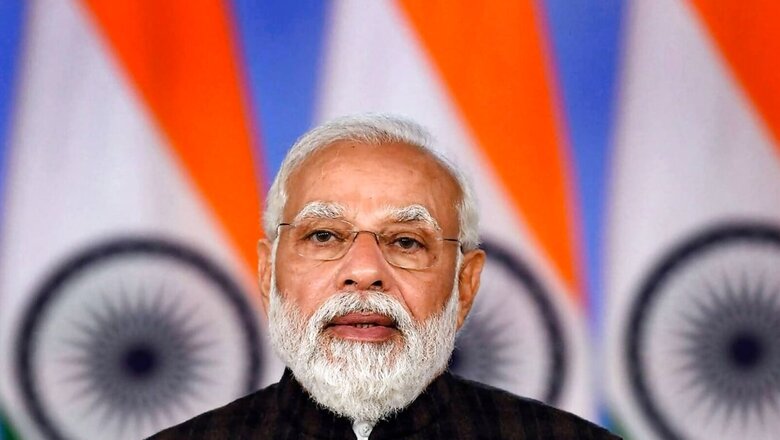
views
Prime Minister Narendra Modi on Wednesday said it is now time that 100 per cent saturation is achieved in providing basic facilities such as water, electricity, gas connections, toilets and roads to people, as he asserted that the Union budget 2022-23 has laid out a clear roadmap for achieving this. Addressing a webinar on the positive impact of the Union Budget 2022-23 on Rural Development, Modi said that in the last seven years, his government made incessant efforts to improve every person and sector’s capability.
“This is the aim of schemes providing basic facilities such as ‘pucca’ houses, toilets, gas connections, electricity, water, roads to villages and the poor people. The country has achieved great success in these schemes but now it is time to achieve saturation of these schemes, to realise the aim of these schemes 100 per cent,” he said.
For achieving this, there is a need to adopt a new strategy for monitoring and accountability, and while making use of technology, new systems have to be developed, he said. In this budget, a clear roadmap has been given by the government to achieve this goal of saturation, Modi said.
In the budget, necessary provisions have been made for the PM housing scheme, rural roads scheme, Jal Jeevan Mission, North East connectivity and broadband connectivity of villages, he said. He said the vibrant villages programme is key for development of border areas of the country.
‘Sabka Saath, Sabka Vikas, Sabka Vishwas and Sabka Prayas’ mantra is the driving force behind our government’s policy and action, Modi said. “We intend to have more active participation of people in rural areas to improve governance by removing silos and fast-track schemes,” the prime minister said.
Modi also urged people to visit border villages to impart a degree of “vibrancy” to sparsely populated regions along the country’s frontiers. The prime minister also called for convergence of efforts to ensure 100 per cent implementation of the announcements made in the Union budget within the given time-frame.
Budget has given a clear roadmap for achieving the goal of saturation of government development schemes benefits and how basic amenities can reach cent percent population, he said. He suggested touring border villages and organising tehsil level competitions in such hamlets to make them more vibrant.
Can we tour border villages, spend a night there, experience the ambience, study the lives of people staying there. This will bring vibrancy to those regions, Modi said. The prime minister also stressed on the need to break silos and make concerted efforts to ensure 100 per cent implementation of schemes such as the PM Awas Yojana and the Jal Jeevan Mission as well as schemes for rural roads, improving connectivity in north-eastern region and providing broadband connectivity in villages.
He said the Prime Minister’s Development Initiative for the North East (PM-DevINE) will ensure the saturation of basic amenities in the region. Similarly, Svamitva Scheme is helping in properly demarcating residences and land in villages as more than 40 lakh property cards have been issued, he said, adding that the budget has also allocated Rs 48,000 crore to build 80 lakh houses. Referring to the target of providing four crore tap water connections under the Jal Jeevan Mission, the prime minister asked officials to step up efforts to ensure that every household in the country had access to clean tap water by 2024.
He also asked every state government to be vigilant about the quality of the pipelines being laid under the Mission as also the quality of water that is proposed to be supplied to households. Noting that rural digital connectivity had become a necessity, Modi said the initiative will lead to creation of a pool of skilled youth in villages and help expand the services sector in the country.
He underlined the role of women power as the foundation of the rural economy. Financial inclusion has ensured better participation of women in the financial decisions of the families. There is a need to push this participation of women further through self-help groups, Modi said. The webinar was attended by Jal Shakti Minister Gajendra Singh Shekhawat, Rural Development Minister Giriraj Singh, ministers of state and officials of more than a dozen ministries and departments.
Read all the Latest News India and Breaking News here



















Comments
0 comment